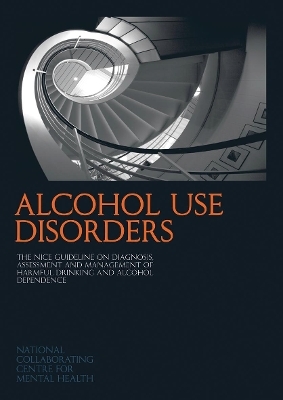
Alcohol Use Disorders
The NICE Guideline on the Diagnosis, Assessment and Management of Harmful Drinking and Alcohol Dependence
Seiten
2011
|
First
RCPsych Publications
978-1-904671-26-8 (ISBN)
RCPsych Publications
978-1-904671-26-8 (ISBN)
- Keine Verlagsinformationen verfügbar
- Artikel merken
A quarter of the UK population drink alcohol at a harmful level and over 4% are dependent. Alcohol use disorders are also increasing in children and young people. This clinical guideline makes clear evidence-based recommendations on how to work with people with people with alcohol use disorders in order to improve their management and care.
Harmful drinking leads to 2.5 million deaths annually and alcohol is the third
leading risk factor globally for burden of illness. Alcohol-use disorders are an
increasing problem in children and young people. Physical and psychiatric
comorbidities add to the considerable burden that alcohol-use disorders can pose
to the individual and to society. This guideline enables healthcare
professionals to recognise and manage these prevalent problems in adults and in
young people aged 10 to 17 years, and offer effective treatments to their
patients.
The guideline reviews the evidence for the diagnosis and
assessment of alcohol-use disorders, organisation and delivery of care, settings
for assisted alcohol withdrawal, psychological interventions, and
pharmacological interventions for assisted withdrawal and relapse prevention. It
also includes health economic modelling of pharmacological interventions as an
adjunctive treatment for the prevention of relapse and a chapter on the
experience of care.
Readership: Primarily specialist
alcohol services. Though the guideline will also be useful for all staff working
in healthcare services; plus academics and researchers.
NICE Mental Health Guidelines
These guidelines
from NICE set out clear recommendations, based on the best available evidence,
for health care professionals on how to work with and implement physical,
psychological and service-level interventions for people with various mental
health conditions.
The book contains the full guidelines that cannot be
obtained in print anywhere else. It brings together all of the evidence that led
to the recommendations made, detailed explanations of the methodology behind
their preparation, plus an overview of the condition covering detection,
diagnosis and assessment, and the full range of treatment and care
approaches.
The accompanying free CD-ROM contains all the data used as
evidence, including:
Included and excluded studies.
Profile tables that summarise both the quality of the evidence and the
results of the evidence synthesis.
All meta-analytical data, presented as forest plots.
Detailed information about how to use and interpret forest plots.
Harmful drinking leads to 2.5 million deaths annually and alcohol is the third
leading risk factor globally for burden of illness. Alcohol-use disorders are an
increasing problem in children and young people. Physical and psychiatric
comorbidities add to the considerable burden that alcohol-use disorders can pose
to the individual and to society. This guideline enables healthcare
professionals to recognise and manage these prevalent problems in adults and in
young people aged 10 to 17 years, and offer effective treatments to their
patients.
The guideline reviews the evidence for the diagnosis and
assessment of alcohol-use disorders, organisation and delivery of care, settings
for assisted alcohol withdrawal, psychological interventions, and
pharmacological interventions for assisted withdrawal and relapse prevention. It
also includes health economic modelling of pharmacological interventions as an
adjunctive treatment for the prevention of relapse and a chapter on the
experience of care.
Readership: Primarily specialist
alcohol services. Though the guideline will also be useful for all staff working
in healthcare services; plus academics and researchers.
NICE Mental Health Guidelines
These guidelines
from NICE set out clear recommendations, based on the best available evidence,
for health care professionals on how to work with and implement physical,
psychological and service-level interventions for people with various mental
health conditions.
The book contains the full guidelines that cannot be
obtained in print anywhere else. It brings together all of the evidence that led
to the recommendations made, detailed explanations of the methodology behind
their preparation, plus an overview of the condition covering detection,
diagnosis and assessment, and the full range of treatment and care
approaches.
The accompanying free CD-ROM contains all the data used as
evidence, including:
Included and excluded studies.
Profile tables that summarise both the quality of the evidence and the
results of the evidence synthesis.
All meta-analytical data, presented as forest plots.
Detailed information about how to use and interpret forest plots.
The National Collaborating Centre for Mental Health (NCCMH) was established in 2001 by the UK-based National Institute for Health and Clinical Excellence (NICE) to develop guidance on the appropriate treatment and care of people with mental health problems and then write the clinical guidelines. The NCCMH is a partnership between the Royal College of Psychiatrists and the British Psychological Society.
Contents
Preface
Alcohol dependence and harmful alcohol use
Methods used to develop this guideline
Experience of care
Organisation and delivery of care
Psychological and psychosocial interventions
Pharmacological interventions
Summary of recommendations
Appendices
References
Abbreviations
| Reihe/Serie | NICE Guidelines |
|---|---|
| Verlagsort | London |
| Sprache | englisch |
| Maße | 170 x 240 mm |
| Gewicht | 1026 g |
| Themenwelt | Medizin / Pharmazie ► Medizinische Fachgebiete ► Psychiatrie / Psychotherapie |
| Medizin / Pharmazie ► Medizinische Fachgebiete ► Suchtkrankheiten | |
| ISBN-10 | 1-904671-26-8 / 1904671268 |
| ISBN-13 | 978-1-904671-26-8 / 9781904671268 |
| Zustand | Neuware |
| Haben Sie eine Frage zum Produkt? |
Mehr entdecken
aus dem Bereich
aus dem Bereich
Kompetenz!Box Therapie und Beratung
Media-Kombination (2024)
Junfermann Verlag
CHF 73,65
Media-Kombination (2024)
Wolters Kluwer Health
CHF 629,95
Therapiespiel zum Erkennen von Emotionen für Kinder und Jugendliche
Lehr- oder Lernkarte (2024)
Julius Beltz GmbH & Co. KG
CHF 44,95


